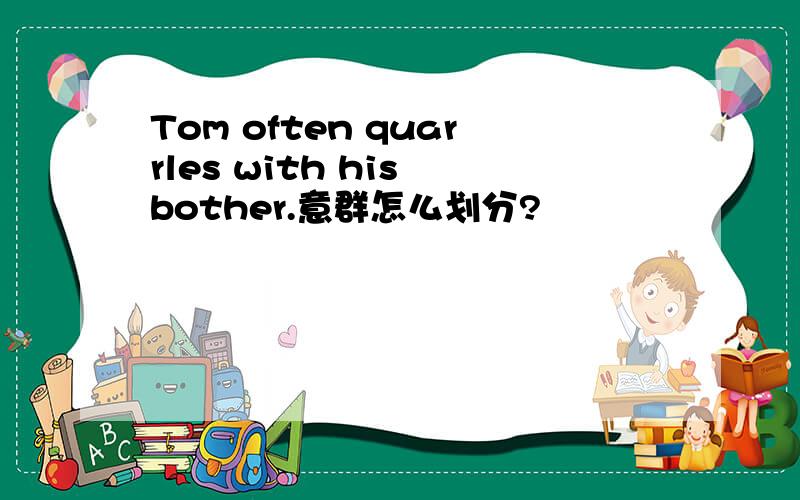Tom often quarrles with his bother.意群怎么划分?
来源:学生作业帮 编辑:大师作文网作业帮 分类:英语作业 时间:2024/11/13 01:04:40
Tom often quarrles with his bother.意群怎么划分?
还有像 I'm pleased with this room.We'll begin with the wxercises.动词加介词是动词短语,那么是不是动词短语在划分意群时也是要放一起?如果是这样那么 begin with ,quarrle with就必须连读吗?
还有像 I'm pleased with this room.We'll begin with the wxercises.动词加介词是动词短语,那么是不是动词短语在划分意群时也是要放一起?如果是这样那么 begin with ,quarrle with就必须连读吗?

这是英文里的一大特点,即动词和介词的组合.不及物动词与介词有固定的组合,不同的组合有着不同的意思.可以这么说,如果你能掌握所有动词与介词的组合,你就英文专家了.不过,别太乐观,目前没有一个美国人会说已经掌握了动词与介词组合的全部使用.
所以说,be pleased with sth/sb; begin with sth; quarry with sb.都是固定的用法.建议你去读读:Dictionary of verbal idioms 方面的书.
还有问题吗?
再问: 我的问题是动词与介词的组合是必须连读吗?在口语上是必须在一个意群里吗?
再答: 我的答复里,已经说了:固定用法,必须连续。 不然的话, 意思完全不一样。 就拿quarry举例:与人争吵, 通常用with, 而为某事争吵,则用about. 再比如take这个动词, 它后门加什么介词,意思会截然不同。 take out (外卖, 拿出去); take on (承担,接受(挑战); take in (被骗了)。
所以说,be pleased with sth/sb; begin with sth; quarry with sb.都是固定的用法.建议你去读读:Dictionary of verbal idioms 方面的书.
还有问题吗?
再问: 我的问题是动词与介词的组合是必须连读吗?在口语上是必须在一个意群里吗?
再答: 我的答复里,已经说了:固定用法,必须连续。 不然的话, 意思完全不一样。 就拿quarry举例:与人争吵, 通常用with, 而为某事争吵,则用about. 再比如take这个动词, 它后门加什么介词,意思会截然不同。 take out (外卖, 拿出去); take on (承担,接受(挑战); take in (被骗了)。
Tom with his friends often ( )footballafter
3.Tom,with his classmates,often ______ football after school
I often help tom with his math的同义句
英语:Tom often plays basketball with his friends after class.(
Mike with his friend ,Tom ,often< > to movie.
Tom often goes__(hike)in spring with his friends
I saw Tom often swims with his father during the summer holi
1.Tom often has a c_____ with his father.He enjoys talking w
tom,with his classmates often __(play)football after school
Tom likes English.He often () it with his classmates. A.spea
tom often talks with his parents on the phone对on the phone提问
Tom often gooes to the ________ with his friends on Sundays.